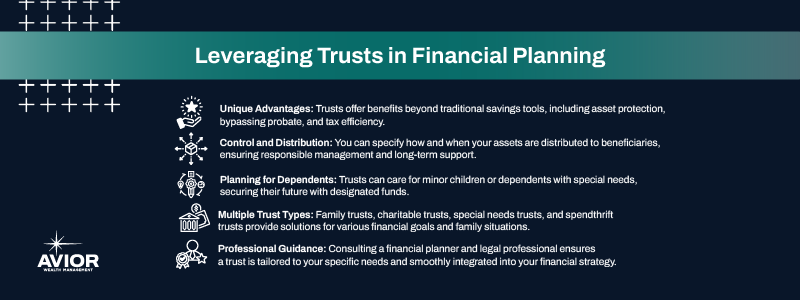Leveraging Trusts in Financial Planning
Interested in establishing a trust? Discover how to select and implement the most beneficial trust for your financial situation.

Creating a comfortable retirement life starts with excellent financial planning that looks beyond simply saving money in a retirement account. Leveraging trusts alongside your traditional retirement accounts goes a long way in securing the financial future of both you and your family.
Trusts work by not only securing your funds but also protecting and managing your assets according to your wishes. When you leverage a financial trust, you call the shots on how your money and assets are handled.
Read on to discover more about how a trust might best fit into your financial planning efforts.
What Are Financial Trusts?
A financial trust is a legal arrangement arranged between a grantor, a trustee, and a beneficiary. The grantor funds the trusts with the cash and assets they desire, the trustee manages the trust, and the beneficiary receives the benefits.
Trusts can serve various purposes, from providing funds for your family members to supporting charitable causes you care about.
The two main types of financial trusts are:
- Revocable, or living, trusts: You can alter or terminate these trusts throughout your lifetime and after they’re created. They provide flexibility and control, so they’re common choices within the estate planning realm. However, the assets you shift over to a revocable trust are part of your taxable estate.
- Irrevocable trusts: Once established, irrevocable trusts cannot be easily modified or revoked. They do provide stronger asset protection and additional tax benefits, but you essentially relinquish control over those assets.
The type of trust you choose will depend on your goals and the level of flexibility you want to have with your savings.
Should I Create a Trust?
While trusts require certain qualifications that other savings and investment vehicles do not, they also carry unique advantages.
Asset Protection
The most significant benefit of a trust is that it shields your assets from creditors, lawsuits, and other claims.
By transferring your ownership of assets to a trust, you can reduce the risk of losing them due to unforeseen financial challenges.
Bypassing Probate
Because of the additional asset protection provided, trusts simplify the transfer of assets to your heirs, bypassing the often lengthy and costly probate process.
Your beneficiaries can then receive their inheritance faster and with more privacy.
Tax Efficiency
Trusts can also provide significant tax benefits. Irrevocable trusts remove assets from your taxable estate, potentially reducing estate taxes.
Charitable trusts also offer income tax deductions while supporting the philanthropic endeavors most important to you.
Asset Control
Trusts allow you to specify how and when your assets will be distributed to your beneficiaries.
This can be particularly useful if you have concerns about a beneficiary’s financial responsibility or if you want to support them over a longer period of time instead of all at once.
Providing for Dependents
Trusts can ensure that minor children or dependents with special needs are cared for according to your wishes.
You can use a trust to designate funds for education, healthcare, and general support, managed by a trustee until the beneficiaries can handle their own finances.
Other Types of Financial Trusts
Depending on your financial goals and family situation, one type of trust may be more appropriate than another.
Here are a few specific types to consider:
- Family trusts: These are designed to benefit your family members, providing long-term financial support, protecting assets, and ensuring your wealth is passed down through generations according to your wishes.
- Charitable trusts: If philanthropy is important to you and your family, charitable trusts allow you to support your favorite causes with added tax benefits. Charitable remainder trusts and charitable lead trusts are common options.
- Special needs trusts: These trusts provide for a beneficiary with special needs without getting in the way of their eligibility for government assistance programs.
- Spendthrift trusts: These trusts protect beneficiaries who may not be financially responsible by restricting their access to trust assets and providing them with regular disbursement.
- Testamentary trusts: These trusts are created through your will and only take effect after your death. Testamentary trusts help you ensure that your assets are managed and distributed according to your wishes.
Think about your goals for yourself and your family later in life. Talk through your trust options with a financial professional who can understand those goals and use them to make recommendations tailored to your specific needs.
How to Include Trusts in Your Financial Plan
Once you’ve answered the question “Should I create a trust?” and have a solid grasp on how the many kinds of trusts might benefit your overall financial goals, you can then work on implementing a trust into your long-term financial planning.
We recommend working with a certified financial planner to make this process smoother.
1. Assess Your Financial Goals
First, determine what you want to achieve with a trust.
What made you consider this option? Are you looking to protect your assets, provide for your family members, support a cause, or all of the above?
Clarifying your goals will inform the type of trust you establish.
2. Choose the Right Trustee
Selecting a trustworthy and capable trustee is crucial, as they’ll be the ones responsible for managing your trust assets and carrying out your instructions.
You can choose an individual, such as a family member or friend, or a corporate trustee, like a bank or trust company.
3. Create a Thorough Trust Document
Work with a legal professional to draft a detailed trust document that outlines the terms, conditions, and instructions for the trust. Once the document is complete, you must sign it and transfer the relevant assets into the trust.
4. Review Your Goals Regularly
Life circumstances and financial goals change over time. Regularly review your trust with your advisor to ensure it continues to meet your needs. Don’t be afraid to make any necessary adjustments as you see fit.
5. Consult With a Financial Advisor
The terms and requirements for trusts can be complex, so seek professional guidance.
Financial advisors can help you understand how and where a trust fits into your overall plan, ensuring the trust is aligned with your wishes and goals.
Establish a Trust That Works for You With Avior
Trusts can bring you and your family many benefits, including asset protection, control, flexibility, and long-term wealth management.
Understanding the different types of trusts can help you incorporate them effectively into your overall financial strategy.
The finance professionals at Avior are here to learn about your unique goals for the future and guide you through the process of establishing the right trust, the right way, the first time.
Start building a more resilient financial plan by talking with our team to learn more about our wealth management services.
At Avior, helping you plan with intention is what we do, but helping you live with a purpose is who we are.
No Comments
Sorry, the comment form is closed at this time.




